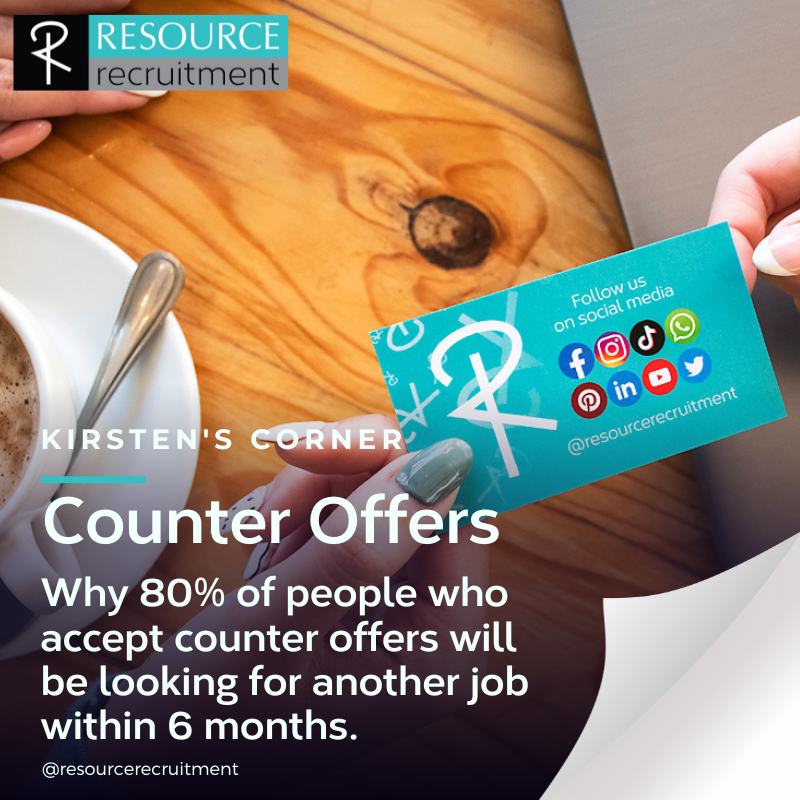
14 Jun The Top 5 Reasons Why You Should Not Accept a Counter-Offer
The Top 5 Reasons
Why You Should Not Accept a Counter-Offer
A Counter Offer is when your current employer responds to an offer from a potential new employer(or your resignation), with a different proposition. Counter Offers generally look attractive for a variety of reasons- change is scary, and it’s a boost to our egos to feel valued and wanted by our current employers. But there are a number of reasons that you should not accept a Counter Offer- here are a few to consider:
Lack of Long-Term Commitment:
Accepting a counteroffer might offer a short-term boost in salary or benefits, but it’s important to consider whether the employer is making the counteroffer out of genuine interest in your growth or as a temporary fix to retain you. Accepting a counteroffer could lead to a perception that your loyalty is in question, potentially affecting future advancement opportunities. Employers know, as much as anyone else, that 80% of people who accept a counter offer, end up leaving within 12 months of accepting the counter offer, and may simply be giving the company time to put succession plans in place.
Damaged Professional Relationships:
The process of accepting a counteroffer can create strained relationships within your workplace. You are forcing your superior to offer you more money and better terms, and often this comes with an unspoken expectation of more work and productivity. You are not getting a counteroffer for the same job, but are paid more to do more! The sheer fact that you have been looking for a job secretly, and resigned (rejected them), is a breakdown of your professional relationship, which whether you both admit it, will take time to heel.
Unaddressed Underlying Issues:
Before considering a counteroffer, it’s crucial to evaluate the reasons that initially prompted you to explore new opportunities. If your concerns were related to job satisfaction, company culture, career growth, or other non-monetary factors, those issues will still be there when everything settles when the initial excitement and attention of the counteroffer have passed, but the original offer will not.
Limited Future Career Progression:
While a counteroffer might provide immediate financial benefits, it could potentially limit your career progression in the long run. Accepting a counteroffer without exploring opportunities outside your current organization might prevent you from gaining new experiences, skills, and exposure that are essential for personal and professional growth. Your current employer may also just be giving you your next increase early, and you find yourself getting a smaller percentage annual increase in years to come.
Get it in writing.
Finally, and I cannot stress this enough, an offer is not an offer until it is in writing! In the initial shock of receiving a resignation, direct managers often make promises that they have not thought through and do not have the authority to make. Once you have declined the other offer, and decided to stay, and the initial shock and threat have passed, they no longer see the need to offer you all the things they verbally promised. An offer is not an offer until it is in writing! You should not resign without an offer from your potential future employer, and you should not decline that future employment, without a counteroffer in writing too.
While a counteroffer might seem like an appealing solution at first glance, it’s important to weigh the pros and cons carefully before making a decision. Consider your long-term goals, job satisfaction, and overall career trajectory when evaluating whether a counteroffer is truly in your best interest. Ultimately, making a well-informed decision will empower you to navigate your career path with confidence and ensure that you’re taking steps toward a fulfilling and successful professional journey.



